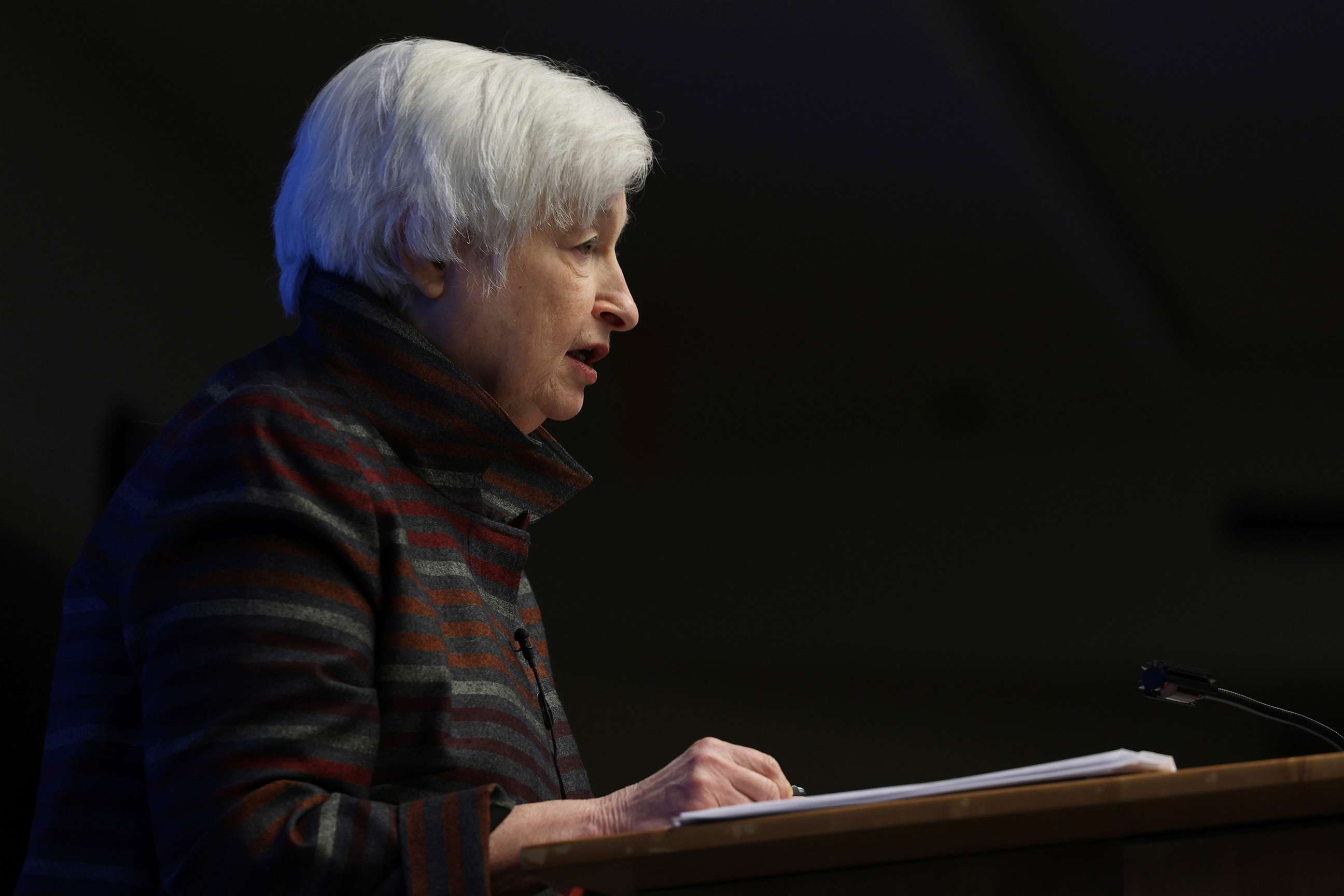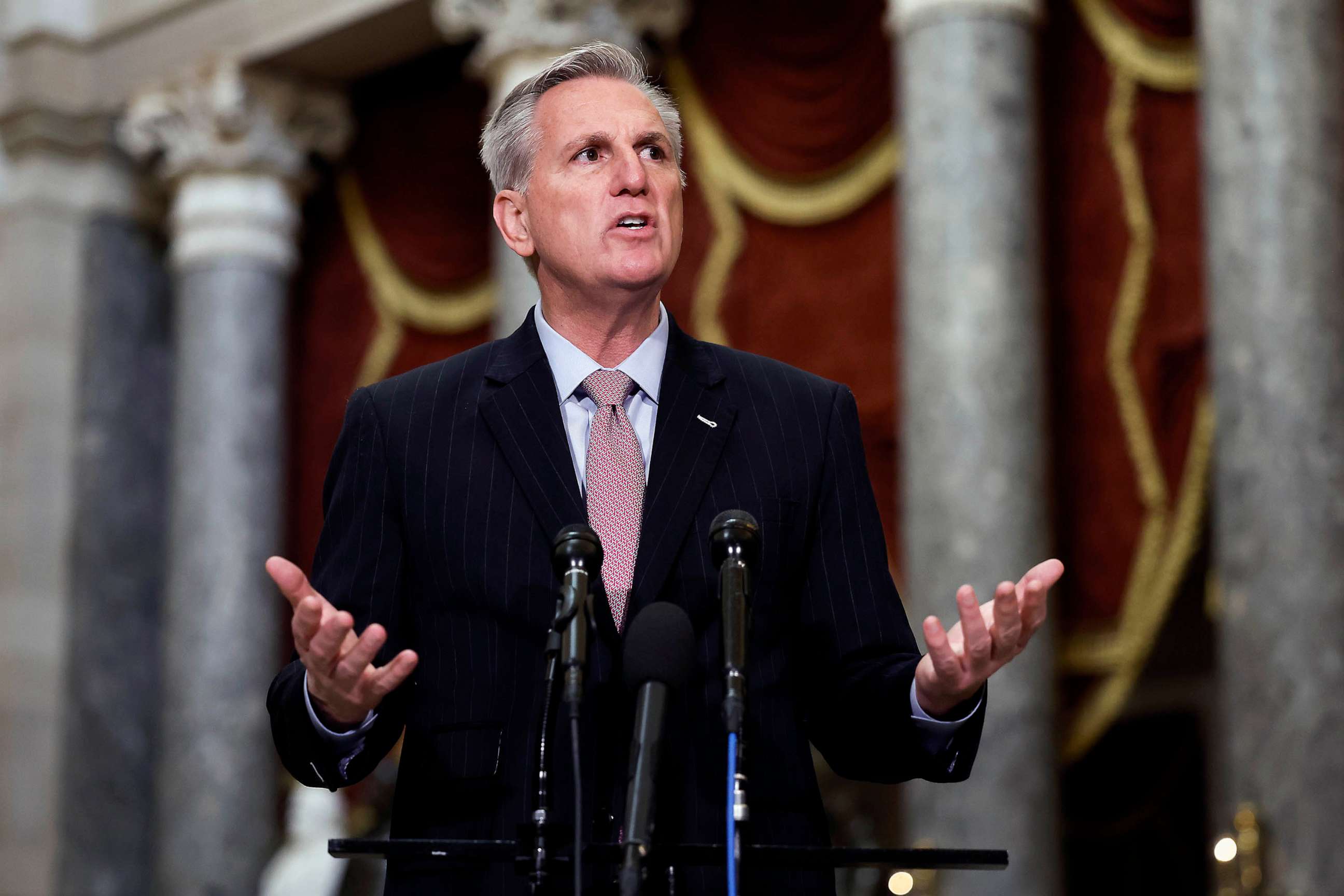Treasury secretary says US to hit debt limit Jan. 19, setting up showdown with GOP
Treasury Secretary Janet Yellen told congressional leaders Friday the U.S. would hit its debt limit next week -- setting up a showdown between the White House and House Republicans, who have vowed to tie any increase in the debt ceiling to spending cuts.
The nation will reach its $31.4 trillion borrowing limit on Jan. 19, Yellen said in a letter, adding that the Treasury Department will begin implementing so-called "extraordinary measures" to manage the government's cash flow if lawmakers don't act to raise it.
"While Treasury is not currently able to provide an estimate of how long extraordinary measures will enable us to continue to pay the government's obligations, it is unlikely that cash and extraordinary measures will be exhausted before early June," Yellen wrote in the letter.
If the debt ceiling isn't raised and the government goes into default -- essentially, unable to pass its bills -- it could be disastrous for the American economy and global financial markets.
Seniors could stop receiving Social Security payments, U.S. military service members could stop receiving paychecks, public health funding could stop, and the nation's creditworthiness could be downgraded -- spiking interest rates, which would raise mortgage, car and credit card payments.

Measures deployed by the Treasury this year could include curtailing investment in some retirement funds.
According to some independent analysts, the U.S. will likely not hit the debt limit until late summer or early fall, but Yellen's letter is sparking concerns on Capitol Hill where Republicans hold a slim majority.
The faction of conservative Republicans that held up Speaker Kevin McCarthy from winning the gavel for days has indicated it won't agree to raise the debt limit unless Democrats agree to significant spending cuts -- and there's not much Democrats appear willing to rescind funding from.
In a joint statement, Senate Majority Leader Chuck Schumer and House Minority Leader Hakeem Jeffries said Friday that Democrats "want to move quickly to pass legislation addressing the debt limit so there is no chance of risking a catastrophic default."
"We've seen in previous debt ceiling stand-offs that even the threat of default leads to even higher costs for working families," the statement said.
Schumer and Jeffries note the debt limit was increased in a bipartisan way three times under former President Donald Trump and twice when GOP had majorities in the House and Senate.
"A default forced by extreme MAGA Republicans could plunge the country into a deep recession and lead to even higher costs for America’s working families on everything from mortgages and car loans to credit card interest rates," the statement said.

Rep. Brendan Boyle, D-Penn., incoming ranking member of the Budget Committee, also called the news "enormously concerning."
"Defaulting on the full faith and credit of the United States should never be an option, and I am tired of Republicans thinking it's acceptable to use our economy as a political hostage to try and force an extremist and deeply unpopular agenda. Republicans need to do the right thing and come to the table to raise the borrowing limit before it’s too late — before our economy and millions of American jobs have been put at risk," he said in a statement.
The White House repeated its position Friday that it will not negotiate over raising the debt limit.
“As you’ve heard us say before, we will not be doing any negotiation over the debt ceiling,” White House press secretary Karine Jean-Pierre said in an afternoon briefing.
She referenced past instances of bipartisan cooperation when the debt limit had to be raised and said “that’s how it should be” this time around as well.
“It's not and should not be a political football. This is not political gamesmanship," she said. "This should be done without conditions and that's how we see this process moving forward."

When asked if the White House stance on not negotiating also applies to spending cuts, which Republicans have promised to pair, Jean-Pierre repeated, “This should be done without conditions.”
“We have seen both Republicans and Democrats come together to deal with this issue. It is one of the basic items that Congress has to deal with and should be done without conditions -- so there is going to be, there's going to be no negotiation over it. This is something that must get done.”
Back in 2011, the debt limit impasse cost the nation its AAA rating. The term "extraordinary measures" became familiar at that time.
ABC News' Zunaira Zaki, Lauren Peller, Allison Pecorin and Justin Gomez contributed to this report.




